
Is That a Pledge Pin On Your Uniform?
Monday, August 27th, 2012
by Arnie Fenner
The topics of art schools, higher education, degrees, and the price tag attached to them come up all the time. You have to go/you don’t have to go. This school is great/that school sucks. They cost too much, they don’t teach the fundamentals, the instructors are incompetent, they don’t prepare students for a career that will pay a living wage, etc, etc, and etc.
The complaints aren’t always wrong, of course. These days a Bachelor’s Degree can saddle the recipient with a student loan debt of $100K to $200K, depending on the institution. For every inspiring, nurturing instructor there undoubtedly is an equal number who are intimidated by creativity in others and shouldn’t be teaching at all. Because of shifts in the marketplace—largely attributable to changes in both technology and society—some schools have pushed the fundamentals of drawing and painting to the rear to emphasize computer skills. Does that frustrate some students? Absolutely. Are the schools wrong to take that direction? I guess it depends.
What does the student really want? Do they want to paint book covers or work in comics or enter the advertising field or design films or become a gallery artist? What do they aspire to? What are their goals? Sure, everyone wants to be the best they can be, but it’s not enough to “want to create art.” The questions have to be asked: for whom? How? What? And the biggest question, of course, is: who will pay you to draw or paint or sculpt or film?
Yeah, it boils down to dirty old dollars. If you don’t make them…you don’t have a place to live and you don’t eat. If you can’t figure out a way to make your art cover your bills, you’re not going to have the time to create it—because much of your time will be spent working at a different sort of job that will. I don’t think I have ever known a successful artist who could only devote their energy and attention to their art part time. It’s the way of the world—and while we all surely know someone who floats through life on a wing and prayer with barely a nickel to their name but who seems to get along just “fine”…we all know that person is an anomaly, an exception to the norm, and not us. (An exception who eventually gets hit by the proverbial bus.)
Above: A Life Magazine photo of students at the University of Iowa painting a model in 1961.
So we go to school, any school, for a number of reasons, and shoulder the expense to prepare for a future in which we can take care of ourselves and earn a living. To achieve the credentials that help us be able to earn a living. And if some schools think that teaching you how to put things together in Illustrator or Photoshop is more important than teaching composition, color, and anatomy…well, that’s appropriate for some artists. Just as it’s not for others. (And, yes, if you want to function as a commercial artist today, you had better bet that you will need some computer chops.) That’s why you pick and choose your educational options carefully. Thoughtfully. Deliberately.
The flip side of the coin is that for any class, any school, any experience to be worthwhile, the student has to invest themselves in it, to literally wring every last bit of knowledge and inspiration that they can from it. One of the most valuable aspects of college—or junior college or workshops—is the interaction with other artists. The friendships, the shared experiences, the dramas and silliness, the failures and the successes, all are as important to making the artist who they are. And those contacts and friendships can go on to help your career when it’s least expected (and perhaps most needed).
Do you have to have a 4 year degree to be a freelance artist? Nope. You just need to be good. Real good—which means you have to work hard, learn everything you don’t know, and work harder. The competition is stiff and the market is fickle: what’s hot today isn’t tomorrow and the artist has to be like a sapling and bend in the wind, not break, then spring back with quality work that the market will respond to (and pay for).
Above: A Life Magazine photo of Thomas Hart Benton painting “Persephone”
at the Kansas City Art Institute in 1939.
If, on the other hand, you want to work as a staff artist for a corporation—Disney, Hallmark, Bernstein-Rein, National Geographic, et al—you need the degree. Skilled or not, without the paper Human Resources tends to toss your resumé in the round file. (Why work for such stiff-necks? Oh…money. Insurance. Security. Paid vacation. Educational opportunities. Retirement benefits. You know: dumb stuff like that.)
Freelance Vs Staff Artist is a topic for another day, but I think what I wanted to briefly touch on is that, regardless of your career path, if you want to be a successful artist you have to work at your craft and keep it fresh. Increasingly there are non-traditional avenues for artists to do so. And—here’s the important thing—no matter if you’re self-taught or have an MFA from Ringling, whether you’re a novice or a pro of long-standing…
You should never pass up an opportunity to learn. You must never pass up an opportunity to get better. You never close yourself off from new experiences and influences and opportunities.
Independent schools and workshops have taken a firm hold on the illustration community, particularly in the last decade; their focus and structure can be invaluable to artists of all ages, stripes, and sensibilities. They can and do provide life-altering learning experiences at a cost significantly less than what is available at most institutions of higher education.
Being an artist means you’re on an unending journey of discovery. You never learn it all. You never know it all. Your education never stops. And you should never be satisfied. That’s why taking advantage of classes like the following…is something worth serious consideration.
The Art Department in Kansas City is headed by John English and features a stellar list of instructors including Jon Foster, Anita Kunz, Sterling Hundley, Jason Manley, Gary Kelley, C.F. Payne and the legendary Mark English.
The TLC Workshops in Bothell, WA got off to a rousing start this year with intimate, hands-on classes conducted by Justin Gerard, Brom and Iain McCaig [above], Terese Nielsen, and, this Fall, Gregory Manchess.
Rebecca Guay’s The Illustration Master Class in Amherst, MA boasts an intensive week of instruction by such masters James Gurney, Boris Vallejo, Julie Ball, Greg Manchess, Dan Dos Santos, Irene Gallo, Iain McCaig, Brom and more.



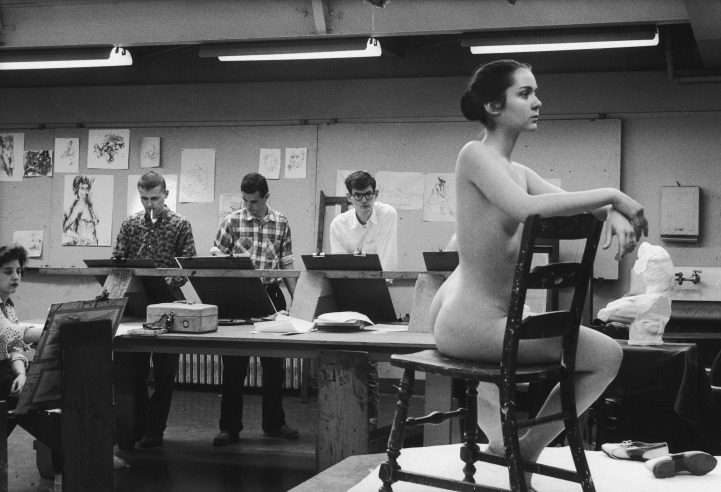
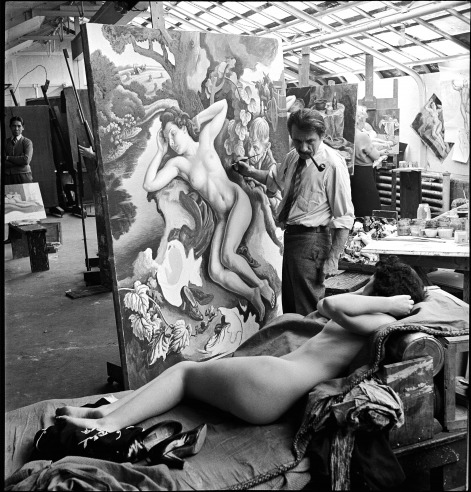

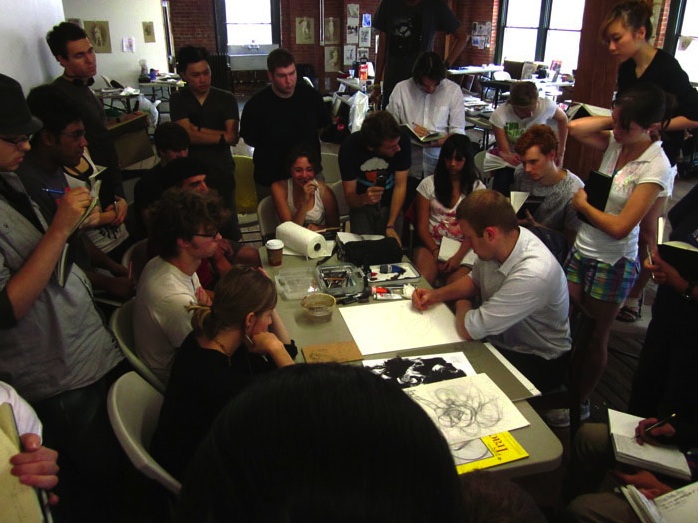

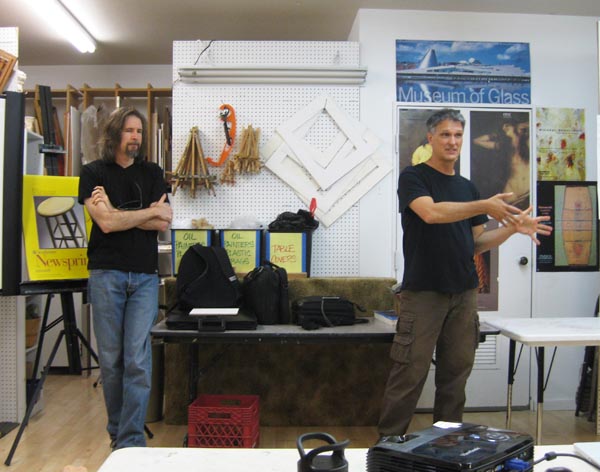

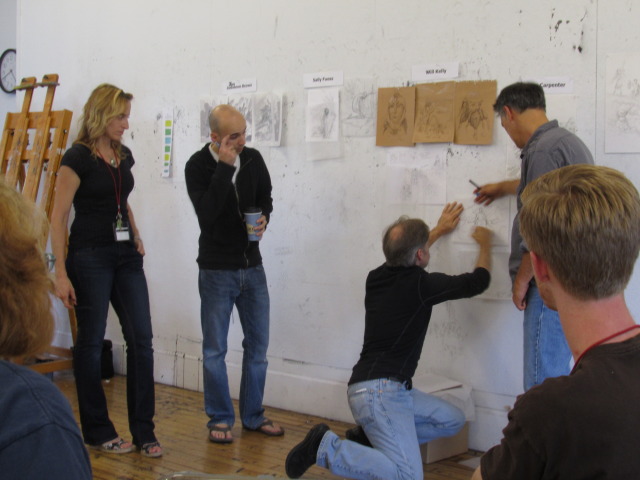

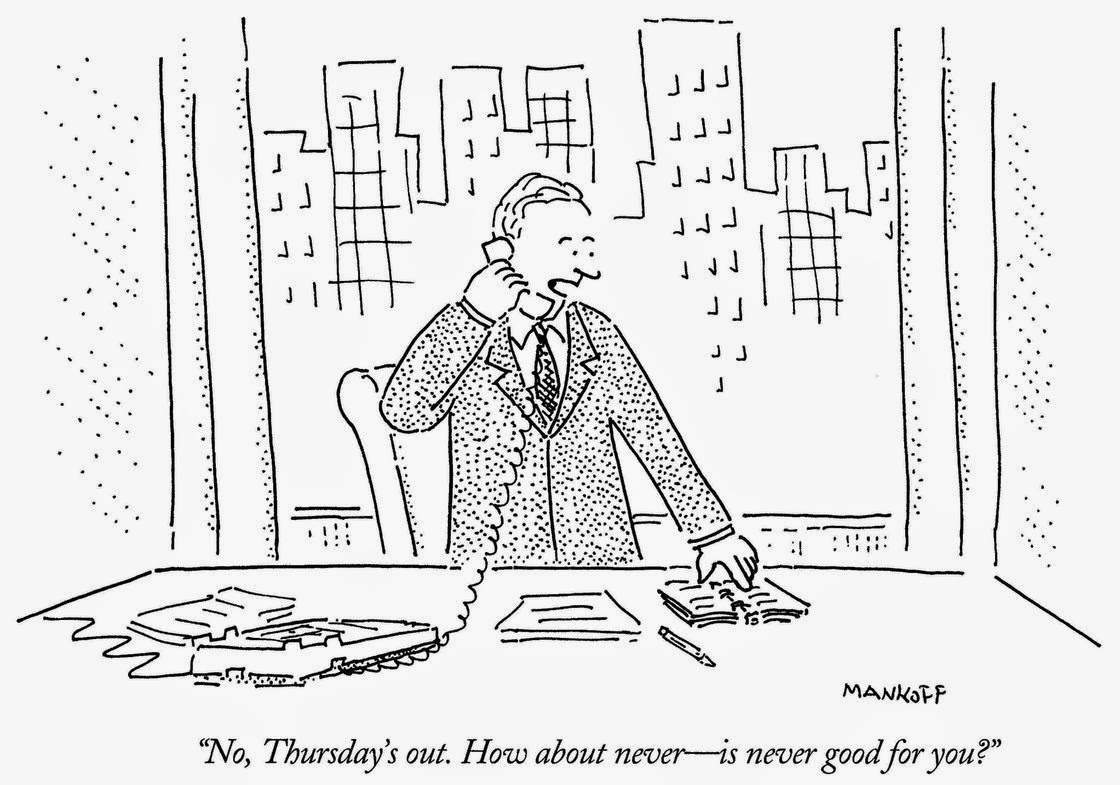



Thank you Mr. Fenner, I really needed this today.
Enter your comment…” I don't think I have ever known a successful artist who could only devote their energy and attention to their art part time.”
Oh, they're out there, Arnie, and you probably even know a couple without realizing it.
One could probably learn more about representational painting and drawing from taking a couple of these courses than spending an enormous amount of money on a 4 year degree. I've never taken any of these courses before, but I have taken college art courses before. It all boils down to the instructor, and to be honest, there are not many instructors in universities that can offer the type of knowledge that's available just in these blogs.
The cost of education is not something that should put one in a lifetime of indentured servitude. Many people who went to college in the 80s and even the 90s have no idea what the conditions are like for students today. I often read articles about student loan debt and the comments below are pretty awful. Something people never consider is the interest on a loan. A 20 or 40 thousand dollar loan may seem affordable, but not when you consider the ridiculous interest rates that come along with them – and also the penalties for not being able to make payments for periods. This really is a form of Neo-Feudalism that's beginning to take shape.
A 17 year old who loves to draw doesn't always know that by signing a few forms they are basically agreeing to a life of debt. Many of these kids don't have parents that are as involved as they should be, and many of them have immigrant parents who believe that a college education is the answer to success. Unfortunately, this may not be the case.
I have heard a lot of contradictory things about the importance of an art degree. Some people say it is needed to get a job at a large corporation. Others say it only helps you get your foot in the door, and after that it doesn't matter. Others say the degree makes no difference. Anyone know which of these things is correct? I know that is hard to answer because there will always be exceptions, but is a degree from an art school that doesn’t teach anything really better than nothing at all? Do they just want a degree or an art degree specifically? If I get a BA in English or something will that be a problem?
I went to RISD for one semester. Ripped off does not begin to describe how I feel about this school. RISD is intentionally rude and impossible to deal with because they want to be perceived as a difficult school, but they find that being a jerk is easier than intellectually challenging students. They do it intentionally, it's some kind of sick hazing ritual. They also expect you to come into the school already knowing everything, making it clear that you are wasting their time if you expect to be taught or ask any questions.
The purpose of an art school is to give professors a well paying, stable job where they do not have to do any real work. Student learning is far from being the top priority. I want to have all of the advantages I can get, including a degree if that is of any importance, but the idea of returning to art school just makes me sick. I’m not fond of the idea of exchanging impossibly large amounts of money for the experience of being treated like a subhuman and being forced to do soul-crushing amounts of pointless busywork.
I go to an atelier now and although I have been here for a few years, it still seems too good to be true that the people here actually care about art. Here it actually matters if I improve or not. Unfortunately they don't offer degrees, and their program doesn't cover commercial art specifically. I have been doing stuff on my own though, and IMC has been an enormous help.
I'm sure there are exceptions, but speaking generally, it's hard to earn a living (and that's what I mean by “success”) as an artist doing it part time. Shoot, it's hard earning a living doing it FULL time! Now I have known many people through the years who worked on the art staff at one company or another and maintained thriving freelance or gallery careers, but they were doing art during the day, then doing a different type of art in the evenings and on weekends; in other words, they were just transitioning from art work A to art work B. I think that would be incredibly hard to do for someone whose day job was totally unrelated to the arts. But, again as you say, there are always exceptions.
Yes, unfortunately the cost of college has become staggering. And it is just as true that college is simply not for everyone. Which is why the ateliers and workshops can be a viable alternative…
By the by…in-state tuition and fees for two semesters to KU “back in my day” (1973) was $570. For what it's worth, gas was about 20¢ a gallon, too. 🙂
Re: Do they just want a degree or an art degree specifically?
Speaking VERY generally…most corporations want applicants to have a degree these days. What kind doesn't always matter, but it is definitely one of the things Human Resources looks for in a candidate from the outset; after you get past those gatekeepers, then it's up to your work (and how well you interview) that gets you the job. (During my days at Hallmark I remember their hiring an artist whose degree was in Forestry.) Undoubtedly it varies from place to place.
The Art Department has been working toward achieving accreditation (and I believe did so recently) so students will be able to earn a degree through them. Which strikes me as a good thing.
In my opinion, especially for art, the degree is worthless. I have a BFA from Wayne State University in Detroit and it was a horrible program. I'm sure there are great programs and teachers out there but by and large I would assume most university art schools are like this one. They care more for philosophy and theory rather than teaching basics like perspective. I'm not lying either, my drawing classes never taught perspective! Too bad i was ignorant and young and didn't call them out. Not to mention they try to destroy the passion you may have for cartoons or comics or fantasy because they're so damn pretentious it hurts.
I've learned more from blogs like this and studying my favorite artists over the past 8 years than I ever did in the university setting. The only class worth taking was life drawing. Everything else can be found in books at the library for free. The university is a money making industry and the teachers are usually more interested in research and publishing rather than teaching. Visual art is like music or acting, if you can do it and produce results that is all that matters. I guarantee if I had what Disney was looking for they wouldn't give two shits about a piece of paper on my wall.
My apologies if i sound bitter but my art school experience left me cold and hating art for a while and wouldn't wish that on any up and coming art student.
I dont know if things have changed since I was there, but Disney does want their artists to have a degree. I think most large companies want their prospects to have a degree because the first set of screeners (HR) might not be terribly knowledgeable when it comes to art, so a degree is an easy bench mark for them to use. After you pass that first hurdle then skill comes into play.
I'm sure like everything else in life there are good college art programs and bad and good ateliers and bad ones. The student has to do their fair share of research in making their choice.
I also think that aptitude comes into play too. I've seen some students make remarkable progress with certain teachers and I've seen others completely waste their time and not improve much if any through their entire 4 years of college. Sometimes it may be the teacher's skill or lack of skill at teaching, sometimes it has to do with the students aptitude or motivation, or any number of factors.
Agreed, I was going to comment on how demotivational and possibly untrue that statement is for a 'part-time' artist like myself…but I'm going to use that feeling to work even longer and smarter.
Can't tell you how much I loathe 'HR' depts in creative industries.. and their inane need to justify their position by screening real creative people based on the 'tick in a box' mentality.
Gaining a degree just to placate this archaic system is a complete waste of a young artists money.. (and life). Put it towards rent, a truck load of Gnomon DVD's, workshops etc and hunker down for 3 years. You'll be better off.
I understand your feelings, Wayne, but things are as they are: everything operates under it's own set of rules and corporations have increasingly become more rigid in their hiring practices. If you want what they have to offer, you have to pretty much play their game. Human Resources Departments, despite the name, aren't really in place for the benefit of the employees: they're primarily there to protect the companies and enforce their policies. Whomever runs or owns the companies gave HR the power to do what they do and while it might seem counter-intuitive and not always fair…they're doing the jobs they were hired to do. Something of a Catch 22, I suppose: a Creative can't get an interview because a Non-Creative doesn't believe they're qualified strictly because they don't have a BFA. Anyway… while there are always exceptions, there's usually no way around HR if you want to work on staff someplace.
And honestly, being a freelancer or contract employee (on special finite projects like films or games) is not for everyone: some like the hustle and challenge and have the energy and skill sets to make it work for them. Others would rather have something more secure…and that increasingly means having to have a degree these days to work for the corporations.
I think the 2008 Census had a statistic that 67% of the people who classified themselves as “artists” held down secondary jobs to in order make a living. Now I think that classification included singers, dancers, and writers in with illustrators and designers, but still…its an indication that being an artist (of any type) isn't exactly an easy way to get rich. That's why you need to have as many “weapons” in your skill arsenal as you can. If that means going to school—for classes OR a degree—then it's worth it. If that means studying the Gnomon or TAD DVDs till they melt—then THAT'S worth it. If it means knocking on a heavy hitter's door and offering to be their apprentice, that's worth it, too.
Arnie, if you were talking education here in Australia, I'd say fair enough, go for the degree, no big deal (we can pay back fees through the tax system ONLY after you earn a certain amount once in the workforce) but your education costs in the US are astronomical! I would be on the street if I had to pay out US fees and loans for a bad art degree.
That system can't sustain itself surely? HR depts will have a smaller and smaller pool from which to hire until someone wakes up and actually looks at kids portfolios instead of hiring based on spurious corporate criteria.
It's art, not banking! 😉
No question that the cost of attending college, much less attaining a degree in the US today, is staggering, even crippling, but…it can be worth it in the end. Depending, of course, on what the artist's career path or goals are. As I said, you most certainly do not need a degree these days to be a successful freelance artist or gallery painter, you just have to be good at what you do and create art people want. But if you want to play in the corporate sandbox, you have to play by their rules—and one of the rules these days is that they want a degree. That doesn't mean that the corporations don't hire freelancers or contractors: they do, more now than ever. Because it's cheaper. A freelancer I use is fast, efficient, and flexible…and makes more money than I do and I'm a Senior Art Director. The other side of the coin, of course, is that the company pays for a big chunk of my health insurance and gives me profit sharing and paid vacation and my freelancer has to pay for everything themselves.
Something of an aside: when I started as an artist at Hallmark in the late 1970s the creative division was a solid mix of people who were high school grads and others with GEDs, people with associates degrees from community colleges, people with BFAs and MFAs. To get hired, you just needed to show you could do the work and there were some absolutely amazing artists there who had never attended college—but there WERE limitations as to how far they could go and how much they could earn. If you didn't have a Bachelors degree it was pretty certain that you'd never advance beyond a particular job level and never become a supervisor; without a Masters, you'd never be in upper management. They pretty much decided who was on what track on day one and rarely if ever deviated from their course. Why aspire to be a supervisor or a manager—or the top title for an illustrator on the boards, Master Artist? Well, again, $$$. Money doesn't buy happiness, but not worrying about not having money is a happy feeling. My supervisor made double what I did; God knows what the department head pulled in. A friend that was a Master Artist (and who had an MFA from Ringling) traveled to Europe every year, sometimes on Hallmark's dime. When I left in 1996 a degree was mandatory to get hired for practically ANY job in the company. So this sort of thing has been going on for awhile: it isn't new.
When it comes to corporations—to business as a whole—it's definitely not “art for art's sake.” Art is a product (or a component in a product) that they're using or selling in one form or another. It's not Banking, but it IS Accounting…for THEM. NOT for the person creating the art, of course, but for the people paying for it (and the salary, insurance and other benefits that go along with an employee)…it is. Regardless of the cost, thousands of students graduate from art schools every year so the pool from which HR Depts have to hire is getting larger, not smaller.
In talking about this, I'm not trying to be discouraging or demotivate anyone (as Don mentioned earlier), I'm simply talking about the way things are working these days. You can have a successful career in the arts in any number of ways but part of achieving success is tied to education in one form or another; whether that's acquired via a traditional college or the independent art schools and workshops mentioned in this post or via intense and focussed deep study is an individual's choice. Just recognize the advantages and disadvantages (there are always both) to whatever road you decide to take.
As a senior university student, this is an interesting subject to me. Have I gotten everything out of my art school experience that I hoped for? Yeah, I think so. Did I expect to learn EVERYTHING? No. I'm older than the traditional college student (34) so I think that I have a bit more life experience to back me up. You get out of college/university what you put into it. Do I need a degree to do freelance illustration,no, but I have learned a TON and I feel more concrete in my process when I get to the professional world because I've had 4 years to develop that process in an environment where I can be mentored by a teacher, rather than trying to figure it out on my own. At some point in the future, I may want to teach at a high school or college, and the degree will afford me that opportunity, because without a degree, that's not an option. I think that what a degree offers is more options. That's just my opinion.
Thanks for this Arnie and thanks for your response Allison. My experience with these discussions, just like any evaluation, is that the discontented always shout louder because they are discontented. People who have had positive institutional experiences feel bullied. Having said that I also understand the frustration with our system in the US. I teach in it. So I'm glad this has remained civil.
To be in this field you have to want it and fight for it. What I have found, for the most part, is that students are not willing to fight for their education. This seems to be a product of being given everything in life and school so now they expect it of teachers at Art Schools or Universities.
I guess it's a good thing that I'm older and will be dying off leaving room for others because I still believe in old things like a university. A place to come and learn. The problem is my model doesn't stand up to the economic model of dog eat dog. We live in a time where every dime we put in must be rewarded with at least a dime coming out or it is a waste.
With all this rambling I am trying to say that only those who are very self aware at a young age will be able to flawlessly choose a path that leads them to the Golden Apple. Otherwise we have to take in information both positive and negative and make a decision for ourselves with what little understanding we have at the time. School is right for some people and not for others. For every person who had a bad experience we can find one with a positive experience. Our system seems to be heading for some radical change even though there are more people pouring in every semester. As we go to a model of career training I hope we don't lose sight of learning.
“I also think that aptitude comes into play too. I've seen some students make remarkable progress with certain teachers and I've seen others completely waste their time and not improve much if any through their entire 4 years of college. Sometimes it may be the teacher's skill or lack of skill at teaching, sometimes it has to do with the students aptitude or motivation, or any number of factors”
“You get out of college/university what you put into it.”
“To be in this field you have to want it and fight for it. What I have found, for the most part, is that students are not willing to fight for their education. This seems to be a product of being given everything in life and school so now they expect it of teachers at Art Schools or Universities.”
“With all this rambling I am trying to say that only those who are very self aware at a young age will be able to flawlessly choose a path that leads them to the Golden Apple.”
These kind of quotes which I've pulled from this very comments section are the things I've heard my whole life when I've trashed my university education. It's such vague drivel in defense of a system that is clearly broken and teacher's who can't teach.
When a student comes out of high school most are not self aware to the point of understanding exactly what it is the university should be teaching, it is after all a brand new experience. This idea that the onus is on the student to do research to make sure the school is worthwhile is ridiculous. Maybe things have changed but back in '98 most kids i knew didn't know where or even why they were going to college, they just knew they had to. A student can only get what is being given and if he is paying and trusting an institution to guide him and make him knowledgeable of the craft he is pursuing he should be given a solid foundation. Any learning or research done on students own time should be to compliment what a teacher is teaching not supplement it. I had one teacher that was worth his pay and if I had just mentored under him I probably wouldn't have had to do all the self teaching I've done in the last 8 years. Students should be motivated and sure any lazy ass even at the best school isn't going to accomplish much but when we are we gonna hold these 'places of learning' accountable.
Sadly, exactly what I expected. An anonymous response. Once again, there are problems and you've had some but that is not everyone's story. So I and someone else shared our thoughts on the matter. Are you saying I'm lying? By taking quotes out of context, and simply not understanding them, you are using the worst of political ploys.
I don't think I ever said that the institution holds no responsibility, but at what point do you take the reigns of a very self-directed career choice yourself? I teach in a university art program and I am not lazy either in teaching or my professional career. I was, however, lazy as an undergraduate student and didn't get as much as I could have. I don't blame my school for that. I am not and will always resist being a “blamer”. It was only after some work experience that I took the reigns in graduate school and then in my career.
Information can be taken in in many ways. For some school is best for others not. I said it before so I thought I'd say it again. Please put all of the thought I write together and don't lift quotes to satisfy your argument.
Art school/college always seems to be something of a hot-button issue for some—particularly for those with bad experiences—and it's easy to get angry and denounce everything. While blowing off steam can be be cathartic…it doesn't change anything. Schools aren't going away, corporations aren't going to change their hiring practices, educational options are going to continue to evolve (witness Rebecca Guay's addition to IMC, smART School: http://www.smarterartschool.com/why.html).
It is certainly true that most 18 year-olds don't know which school is the best match for them, but that's where high school school counselors and parents and friends come into the equation. Any decision that momentous (and expensive) has to be carefully thought through before taking the plunge. And if the choice DOES turn out to be a wrong one, don't stay in a crappy situation…transfer. There is never only one option.
The same with the various classes and workshops I've discussed: there is no one-size-fits-all. What works for one student doesn't for another—but that doesn't mean ALL classes or workshops or ateliers or apprentice programs suck. Only that everyone is different. But it is also true that EVERYTHING is a learning opportunity and there is something positive to be gleaned from every class.
This is all a sidetrack, though: the facts are the facts. 1] Everyone can benefit—technically, professionally, intellectually, emotionally—from taking advantage of educational opportunities, regardless of the form those opportunities come in. 2] If you want to be employed full-time by a corporation today (or teach in high schools or universities, as Allison mentioned) its almost a certainty that you will need a degree of one sort or another. And 3] You can be successful artist without going to college and without a degree, but you will have a much better chance if you have some kind of training/education/classes/workshops. Nobody is born knowing it all and that means going out and taking in all of the knowledge you can from every available source.
Frank Frazetta attended Michel Falanga's small art school on weekends from the age of 8 to 12 (his only academic training). He apprenticed with John Giunta at 16 and was mentored by Ralph Mayo and Graham Ingels. In his 20s he regularly attended life-drawing sessions, was advised by the artists in Al Capp's studio and nurtured by Roy Krenkel. Frank never graduated from high school and never went to college, but he was always learning…and he seemed to turn out okay. 🙂
Thank you for your posts–all of you–I am gaining more from this website and a few others than I gained at Forestry college! Seriously. My original degree is in Forestry, but I went on to study ceramics and art education. I was reading through, curious about furthering my art/illustration knowledge/skills sets, which are light years behind all of yours, and I'm always open to taking a course…although plenty intimidated and practicing on my own, hoping to be able to take some advanced instruction someday…and the forestry thing gave me a good laugh!
Hey! That's the back of my head in the IMC picture! And my brown (pretty slovenly) tone sketches on the wall! I made it to the Muddy Colors blog! Woohoo!
Okay, that's out of the way:D glad you all could meet my head.
Now I can say that IMC was most certainly worth the time and money, and I learned about as much or more from that week as I did throughout two years of college level art classes put together. I dropped out of art school because of two reasons:
1. It was killing me financially.
2. I finally realized that I don't need a degree to work as a professional illustrator, and, like Arnie mentioned, instead it will require HARD WORK.
The hardest part for me is just maintaining a momentum, finding directions to push my art into, and wondering how in the world I'll ever make a “living” doing this.
Arnie, I'd love to see a post maybe about some tips for “doing it on your own”, I.E., not going the art school route. The classes that are mentioned here are a fabulous way to address some of these problems that the “self-study” artist finds him/herself dealing with… but are there any practical tips on doing what needs to be done to be successful on our own.
Thanks,
Will
Bill is it? Sounds just about as anonymous as any other name on the internet, so I'll gladly ignore the assumption that I'm hiding or being brave cause I'm anonymous. I'm guessing since you are a teacher yourself in an university you have taken my comments so personally? To be clear I'm not attacking you and I don't think you're lying. I'm only doing what you are, sharing an opinion. I have not once claimed this experience is everyone's experience, I'm well aware we all have varying experiences and I'm merely sharing my crappy one. ( I haven't denounced everything or said ALL classes suck either.)
I don't believe I took anything that you said out of context and I'm sure as hell not using a political ploy. But lets say I did and now I need you to correct that. Please explain to me then what 'students are not willing to fight for their education' means?
It would seem because I have some very true and negative things to say about university teaching that you're insinuating that I am a 'blamer'. I too don't subscribe to victim-hood but sometimes its just a truth that an institution like education can fail. I'll say it , IT FAILED ME. I said it and it's not whining or crying, I'm not being a little bitch or saying 'woe is me', its just fact. Just because someone gives a negative critique does not automatically make that person someone without accountability. It would have been wonderful to change my situation but I didn't really have that luxury. Blaming would be if I had stopped learning afterward but I didn't and I still improve and learn to this day. I've always been passionate about art, I was the best student in any class I was involved kindergarten through college graduation and yet I was under prepared when I left college. Sorry that just shouldn't happen. The school did not cherish or hone my ability to a professional level. There was no mentoring or taking me under a wing . There was a lot of robotic curriculum and empty critiques and going through the motions and in the end they hand you a degree and you think you're done.
Then you wake up one day and realize you've barely scratched the surface of this discipline and your older self starts thinking 'what the fuck did they teach me?' I started reading so many books covering everything from watercolor to perspective to oils and it was a constant flow of 'wow we didn't cover this', or 'damn why didn't they show me this technique?' and a lot of it was basic artist 101. I was fooled by my natural talent getting me through but realized I didn't know squat about art. It was a pretty messed up feeling to look at a degree on the wall and know that it was empty, to know that you didn't learn half the stuff you should have and you were perplexed as to why or how that could happen. I fought for my education by working my ass off 30 hours a week on top of classes to pay their tuition. I held up my end of the bargain they did not.
None of what I said means I didn't put my all into my art or my other classes, that doesn't mean I want to play the victim, that doesn't mean I'm against all things school, it means that schools have to be accountable as well, they are are not and shouldn't be immune to harsh words. It's not just cathartic to critique schools like this it absolutely a necessity. Universities should be subjected to the harshest evaluations because people put time, money, money, money, and a whole lot of effort into them.
🙂 Besides the artist with a degree in Forestry there were a couple with English degrees, a graduate of the KC Police Academy, and one (a close buddy to this day) with degrees in psychology, philosophy, AND art. When he wanted to have some fun he'd engage in a little Sophistry with people in the department: it'd drive them crazy.
Anyway…you shouldn't feel intimidated to interact and talk art (and show art) with your peers. Many of them are incredibly thoughtful and giving; they remember coming up through the ranks and want to help. When Donato says knock on his studio door, he means it. Greg Manchess has stood and talked with people for an hour, answering questions and looking at their books, after having given an hour-long painting demo. Dan Dos has been doing art crits as a way of helping artists grow their skill sets. And no one gets more jazzed about teaching and helping artists than Iain McCaig. He did two intensive workshops at Spectrum Live in May and he's coming back to do it again (and maybe more!) in 2013. So don't feel intimidated: reach out, interact. You'll be glad you did!
“With all this rambling I am trying to say that only those who are very self aware at a young age will be able to flawlessly choose a path that leads them to the Golden Apple.”
In context this quote was a criticism of education. In context all of my support of education had caveats.
I work with students every day and so I apologize for generalizing about 80% of my students who do not fight for their education. I understand you are talking about your reality but I am talking about mine and reality that I see very day.
Our educational system is among the worst in the world, of those who actually have working educational systems, but I wish I had a hard number for you representing how many blame their ills on a system rather than on themselves.
I think vague drivel probably set me off more than anything. I don't believe I was vague and I may drool a little but certainly don't drivel. I was speaking from a lot of experience. And if you click on my “bill” it leads to some information. I am just not a fan of those who drop by with opinions and do it behind a curtain of anonymity. This bit of personal dislike comes from, ironically, an educational system which supports anonymous evaluation.
Your comments may not say that you are against all things school but you certainly are not happy with your experience and it seems to carry over to your opinion of the system even though it is limited to your experience. I will never argue that many schools and departments are broken and many faculty in working departments are broken but there are some schools and faculty who are not. What people need to figure out is if the gain can be worth the money.
Anonymous–
And here's the thing, regardless of your feelings about your degree, having it puts you near the front of the line if you apply for a job at a corporation. It can get your foot in a door that is closed to those without it. Maybe that's not the type of job you want…today. But it matters.
From my standpoint, I learned a lot in school and I learned a lot more when I entered the work force. I picked up different techniques, approaches—ways of “seeing”—as I went. Practical application. Deadline desperation being the mother of invention. But going to school gave me a foundation to build on and I took classes after I was hired by Hallmark—and some of them they either sponsored in-house (I took workshops with Mark English and Etienne Delessert) or paid for me to attend. I would most probably not have had those opportunities without college. NOW there are opportunities to learn from artists in any number of settings…and they should be taken advantage of.
Some artists come out of schools and become instant stars; that wasn't me (and still isn't). That degree gives you an edge: you may have been disappointed in many aspects of getting it, but it's worth something. Trust me.
And “Bill”? This guy?
http://muddycolors.blogspot.com/2012/06/guest-blogger-bill-carman.html
Well, let's just say “Bill” knows his way around a paintbrush AND a classroom.:-)
My apologies for vague drivel. I actually meant to take that out since it broke my own rule about insulting during what should be rational discussion but forgot and then said 'oh well fuck it'. I guess I get set off because I just want to make others wary and picky about school so they don't have the same experience I had. I was guilty in generalizing schools as 'bill' was in generalizing students.
And since I'm aware of who I'm talking to then I'd like to say that I am a fan of Mr. Carmans work, but regardless I don't intend to disrespect anyone no matter who they may be. My question still stands and I hope you could answer because you've said it again Mr. Carman, what do you mean when you say 'students who do not fight for their education'? Shouldn't that be given freely by the instructor? Please clarify cause its just not sitting right in my gut or my brain. And to be fair my name is Ken(If you didn't see it up top) and I certainly do not know my way around a paint brush, but I like ink and pencils a whole lot.
http://itsmyblood.carbonmade.com/about
I wonder if there is a place to get some unbiased statistical data about number of art jobs available vs number of art graduates, or would that be too depressing. I know this is nearly impossible to gauge when you throw in freelance or Fine Arts. Regardless of the current state of the economy, those cold hard numbers might supply a more realistic expectation. Over 20 years ago when I was in college we all “joked” about half of us winding up flipping burgers.
Schools continue to grow and get more expensive because every year there are more students that want to attend. This means every year there are more and more artists for companies to choose from, whether for full time or freelance work. With so much competition for a very finite amount of opportunities, inevitably that means only the very top talent is going to “succeed”, some will survive, some will wind up doing something completely different than what they hold a degree in.
I'll look around for some stats regarding jobs vs applicants (while mulling other bits over). But in the meantime here are a couple of interesting articles relevant to the conversation:
http://www.usatoday.com/news/education/2011-05-03-inside-higher-ed-arts-programs-college_n.htm
http://www.insidehighered.com/news/2011/03/16/rhode_island_school_of_design_faculty_vote_against_president_for_specific_and_universal_reasons
Great articles, thank you for sharing those so quickly!
Wow. Upwards of $200K for the opportunity to make $34K/yr? That's idiotic. If you have rich parents you can sucker into that deal then go for it. But if you're borrowing much of that price tag you are not buying a life of self determination and creative freedom. You are buying a set of shackles with long reaching chains that will restrict innumerable life choices for the next 50 years. Life is long and choices are many. Don't limit yourself from day one.
At 18, four years seems like an eternity and massive sums of money may seem like some vague inconvenience you can easily deal with 100 years down the road, you know, when you're 30. They are not.
Shackles for 50 years? Wow! that must be a terrible interest rate! 🙂
Okay, let's look at this realistically without denying for a moment that the cost of a college education at some schools is ridiculous (not at all, particularly if you attend college in the state you live in and avoid significantly higher out-of-state tuition): the $34K income sited was an AVERAGE without regard to type of artist (remember that dancers, writers, designers are part of the mix), age, experience, area of the country, etc. so don't read too much into it.
You have to look on education as an investment, hopefully one that will pay off in the future. Your education, whether it be via college or independent study, should help you INCREASE your income—and usually does. Not always, but usually.
Compare it to the “investment” of buying a car for, say, $25K and paying off a loan for five or six years: sure, you get use out of the car and you might even use it for business purposes, but the value decreases the moment you drive off the lot and continues to do so until you trade it for something else—then the cycle starts again. Figure out the interest you're paying for that car loan (for something that will never be worth the amount you paid for it)… No matter what you do, you'll never be in the Black.
Spending the money on an education (any kind of education) can leave you painfully in the Red for quite some time, but eventually you come out the other side—as with any sound investment. Regardless of what you are investing in, you're in it for the long-haul in order to get the pay-off; it's not a game of instant gratification. There are many, MANY artists who make significantly more than $34K a year. Including that freelancer that I referenced using earlier.
I always love your posts Arnie. 🙂
I have a doctorate and a fulfilling, rewarding career, so am by no means against a traditional education. My 50 year comment was referring to not just the loan repayment, but the sequence of career and life choices you must make from graduation through middle age because of that debt. Those choices don't just affect your career. They also affect the family you choose to build or not build throughout your young adult years.
I understand that there are many successful artists out there who are not struggling financially. I propose that most of them have a strong work ethic and drive. The kind of people who tend to rise to the top in whatever endeavor they choose – not because they shelled out 200K.
I advise anyone to get a degree. It is valuable. It might even be worth 200K to go to a top notch highly selective school for the access to other “vetted” peers and a strong network. Sort of like Law School. If you get in to Yale you are unlikely to fail the Bar exam and you are very likely to get a lucrative job. Not so from a 4th tier private school that costs just as much. But the average student would be much better off getting a less expensive degree from their local public University and taking an active role in furthering their own education. As you suggested in the original post.
The truly exciting thing about this day and age is the revolution in options. It is soo darn easy to learn just about anything these days. From a guy who grew up spending hours at the library using the dewey decimal system, this is a fabulous new world.
I have been in the video game industry for 12 years now and I have to say that your portfolio is way more important than a degree, even for big companies. Of course, it's easier to get past HR if you have all the “right” boxes ticked. But really, the fact that you have sci-fi instead of fantasy in your portfolio, or that you can do SFX, that you know the right software, or that you worked on AAA rather than casual games or vice versa is MUCH much more of a factor. And when you know someone inside the company who can refer you, the degree becomes completely useless.
Bill is having trouble posting and forwarded his thoughts to me to put up. So…from Bill:
—-
Ken, Having a discussion this way is always a problem. Oh for the
good ole days when artists sat around in cafes sipping espresso and
talking about art.
One thing before I answer your question. Speaking from and experience
and generalizing from here say are two different things. Both have
their problems but they are different.
There are a lot of things that should be freely given by the
instructor but information without context is usually ignored. I can
tell one student that drawing from life and models is the key but
another student who wants to be a syndicated cartoonist might tune me
out. I get students coming in with varied backgrounds, varied
abilities and varied dreams. Do I give them all the same things? If I
were teaching only one thing I might be able to cross the varied
dreams part off the list but the others will always be there. It's not
just wrote information we are giving. You might have worked hard and
know what worked for you but I will guarantee it won't work for
everyone. So what does freely given by the instructor mean?
Here's another thing. Our educational system (USA) guides us by the
hand from pre-school on. Buy this pencil, this notebook, write like
this, think like this, you know what I mean. We teach en masse and not
individually. When students enter college we give them this tour, that
book and even packets with all of their art stuff in it. In short we
prepare them to be reliant.
I want students to be unsure. To need to ask questions, and learn to
ask questions. They need to, respectfully, demand things of their
instructors like excellence. The first day I introduce myself and show
them that I am a pro and will work alongside them. I also tell them to
ask their other instructors to fill them in on what they are doing. If
a student wants to be a certain thing then they need to find out what
that thing is. The teacher is only one source. If you have been
working in the business at all, and it looks like you have, you know
that there is nothing more self-directed. You have to fight every day.
Taking students by the hand prepares them to fail making them learn to
ask helps them to stand up.
I offer what I can in the organization of a classroom but that is such
a small part of an education that the student will always fail if they
don't learn to take the responsibility themselves instead of going the
easy route of “I failed because of so and so.”
You're famous now, Will! Hmm…at least the back of your head is, anyway. 🙂
I think a “non-traditional path” post will be a good subject in the future. Stay tuned.
As mentioned earlier, there are always exceptions—and I think Greg had a great post about the importance of a solid portfolio awhile back—but knowing the right software is, again, tied to some form of education, right? Fooling around with the program gets you only so far and then you need those instructional videos from Gnomon or need to experience live demos by Android Jones or need a 2 week class evenings at the community college. Otherwise, how are you going to be able to really know everything that new software does?
That's the gist of this post, really: we can't do it all alone. We can't learn in a vacuum. The subject is not the cost of acquiring an education, but rather the cost of not pursuing an education (in whatever form it may come).
And…a degree is NEVER useless.
Patch—I agree! 🙂
Everything is a life choice, really, so I understand your comment regarding the long-term implications of amassing student-loan debt. I'm paying now for the abuse my body took playing football close to 40 years ago (crap! that makes me feel old to say!). But I CAN say the debt incurred for school was worth it. (While it seems cheap today, a $2500 loan in the 1970s was a HUGE undertaking and I'm sure my parents had a number of sleepless nights worrying.)
Wealth and privilege obviously are advantages a few have and the majority do not—and that's where desire and hard work and determination come into play. I'm not suggesting that students flock to RISD and pay $50K s year to attend, ESPECIALLY if they can't afford it, but AM saying that education in one form or another is necessary for success and should be pursued at every opportunity by artists with enthusiasm.
Hoping today the comment gods will be kinder. You've hit it on the head for me again Arnie. Even if you had a miserable experience with an art department can you really say an education or degree is worthless? I will guarantee that if you just take the core classes that you will write, read, and math better and probably think better without even knowing it. Overpriced maybe but not useless.
Quitsune, I know what you mean. The piece of paper stating “degree” is useless as a ticket to art glory. But we can't forget what goes into buying that ticket.
And an artist's education is never really complete, we're always or should be learning and improving.